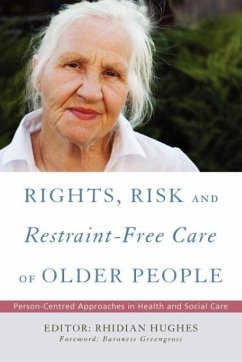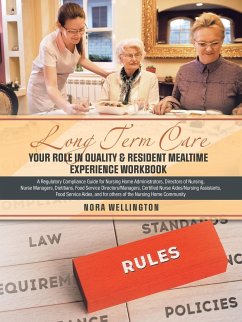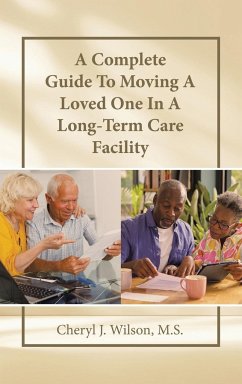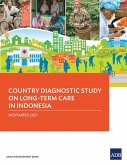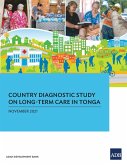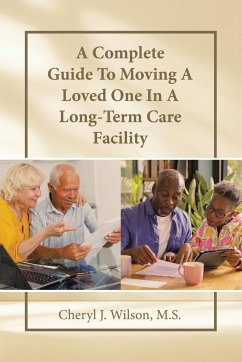Rights, Risk and Restraint-Free Care of Older People
Person-Centred Approaches in Health and Social Care
Herausgeber: Hughes, Rhidian
Rights, Risk and Restraint-Free Care of Older People
Person-Centred Approaches in Health and Social Care
Herausgeber: Hughes, Rhidian
- Broschiertes Buch
- Merkliste
- Auf die Merkliste
- Bewerten Bewerten
- Teilen
- Produkt teilen
- Produkterinnerung
- Produkterinnerung
This book provides health and social care professionals with an authoritative reading resource on the ethics and use of restraint. It provides an overview of the different forms of restraint, the conditions under which they are used, and their implications for the health and wellbeing of older people.
Andere Kunden interessierten sich auch für
![LONG TERM CARE YOUR ROLE IN QUALITY & RESIDENT MEALTIME EXPERIENCE WORKBOOK LONG TERM CARE YOUR ROLE IN QUALITY & RESIDENT MEALTIME EXPERIENCE WORKBOOK]() Nora WellingtonLONG TERM CARE YOUR ROLE IN QUALITY & RESIDENT MEALTIME EXPERIENCE WORKBOOK30,99 €
Nora WellingtonLONG TERM CARE YOUR ROLE IN QUALITY & RESIDENT MEALTIME EXPERIENCE WORKBOOK30,99 €![A Complete Guide To Moving A Loved One In A Long-Term Care Facility A Complete Guide To Moving A Loved One In A Long-Term Care Facility]() Cheryl J. Wilson M. S.A Complete Guide To Moving A Loved One In A Long-Term Care Facility38,99 €
Cheryl J. Wilson M. S.A Complete Guide To Moving A Loved One In A Long-Term Care Facility38,99 €![Country Diagnostic Study on Long-Term Care in Indonesia Country Diagnostic Study on Long-Term Care in Indonesia]() Asian Development BankCountry Diagnostic Study on Long-Term Care in Indonesia41,99 €
Asian Development BankCountry Diagnostic Study on Long-Term Care in Indonesia41,99 €![Country Diagnostic Study on Long-Term Care in Tonga Country Diagnostic Study on Long-Term Care in Tonga]() Asian Development BankCountry Diagnostic Study on Long-Term Care in Tonga39,99 €
Asian Development BankCountry Diagnostic Study on Long-Term Care in Tonga39,99 €![New Paradigms in Caregiving and Home Care New Paradigms in Caregiving and Home Care]() New Paradigms in Caregiving and Home Care146,99 €
New Paradigms in Caregiving and Home Care146,99 €![A Complete Guide To Moving A Loved One In A Long-Term Care Facility A Complete Guide To Moving A Loved One In A Long-Term Care Facility]() Cheryl J. Wilson M. S.A Complete Guide To Moving A Loved One In A Long-Term Care Facility19,99 €
Cheryl J. Wilson M. S.A Complete Guide To Moving A Loved One In A Long-Term Care Facility19,99 €![I Care for England I Care for England]() G. MariaI Care for England15,99 €
G. MariaI Care for England15,99 €-
-
-
This book provides health and social care professionals with an authoritative reading resource on the ethics and use of restraint. It provides an overview of the different forms of restraint, the conditions under which they are used, and their implications for the health and wellbeing of older people.
Hinweis: Dieser Artikel kann nur an eine deutsche Lieferadresse ausgeliefert werden.
Hinweis: Dieser Artikel kann nur an eine deutsche Lieferadresse ausgeliefert werden.
Produktdetails
- Produktdetails
- Verlag: Jessica Kingsley Publishers, Ltd
- Seitenzahl: 226
- Erscheinungstermin: 1. Januar 2010
- Englisch
- Abmessung: 229mm x 152mm x 12mm
- Gewicht: 335g
- ISBN-13: 9781843109587
- ISBN-10: 1843109581
- Artikelnr.: 26763803
- Herstellerkennzeichnung
- Libri GmbH
- Europaallee 1
- 36244 Bad Hersfeld
- gpsr@libri.de
- Verlag: Jessica Kingsley Publishers, Ltd
- Seitenzahl: 226
- Erscheinungstermin: 1. Januar 2010
- Englisch
- Abmessung: 229mm x 152mm x 12mm
- Gewicht: 335g
- ISBN-13: 9781843109587
- ISBN-10: 1843109581
- Artikelnr.: 26763803
- Herstellerkennzeichnung
- Libri GmbH
- Europaallee 1
- 36244 Bad Hersfeld
- gpsr@libri.de
Rhidian Hughes is a Visiting Senior Lecturer at Guy's, King's and St Thomas' School of Medicine and Visiting Senior Researcher at Institute of Gerontology, King's College London
List of Acronyms and Abbreviations. Foreword by Baroness Greengross. Preface. 1. Introduction. Rhidian Hughes. Part 1. Types of Restraint
Patterns and Trends. 2. Physical Restraint and Medical Interventions. David Evans
Senior Lecturer and Program Director
University of Adelaide
Australia. 3. Covert Medication and Chemical Restraint. Carmel M Hughes
Chair in Primary Care Pharmacy
Queens University
Belfast
Northern Ireland and Kate L Lapane
Professor and Chair
Department of Epidemiology and Community Health
Virginia Commonwealth University. Part 2. Perspectives Across Health and Social Care. 4. Pennsylvania's Non-Restraint Approach to Psychiatric Care and Services. Gregory M. Smith
Chief Executive Officer
Allentown State Hospital
Pennsylvania
Donna Ashbridge
Chief Executive Officer
Danville State Hospital
Pennsylvania
Aidan Altenor
Director
Bureau of Community and Hospital Operations
Pennsylvania Department of Public Welfare
and Robert H. Davis
Associate Medical Director
Office of Mental Health and Substance Abuse Services
Pennsylvania. 5. Restraint: The US Nursing Home Perspective. Beryl D. Goldman
Director
Kendal Outreach
Pennsylvania
Joan Ferlo Todd
Senior Nurse Consultant
US Food and Drug Administration
Janet Davis
Activities Director
Pennsylvania Restraint Reduction Initiative and Karen Russell
Regional Director
Pennsylvania Restraint Reduction Initiative. 6. Ethical Dilemmas in Maintaining Enteral Feeding: The Use of Hand-Control Mittens. Jane Williams
Consultant Nurse in Stroke Care
Portsmouth Hospitals NHS Trust
Portsmouth
UK. 7. Do We Need Drugs? Strategies to Reduce the Over-Prescription of Drugs in Care Homes Supporting People with Dementia. 8. The Therapy of Companionship. Jim Ellis. 9. Health and Safety Perspectives. Stephen Clarke. 10. Human Rights Perspectives. Rhidian Hughes. Part 3. Issues and Innovations. 11. Clinical-Ethical Considerations on the Use of Physical Restraint. Chris Gastmans
Professor of Medical Ethics
Catholic University of Leuven
Belgium and Secretary General
European Association of Centres for Medical Ethics (EACME). 12. Changing Restraint Use: Discourses in Restraint. Kate Irving
Lecturer in Nursing
Dublin City University
Ireland. 13. Therapeutic Approaches and De-Escalation Techniques. Suparna Madan
Geriatric Psychiatrist and Clinical Assistant Professor in Geriatric Psychiatry
University of Calgary
Alberta
Canada
and Pat Rowe
Geriatric Mental Health Consultant
Alberta Health Services
Calgary
Alberta
Canada. 14. Wander-Walking and People with Dementia. Jan Dewing
Visiting Professor in Aged Care and Practice Development
University of Wollongong
New South Wales
Australia
Honorary Research Fellow
University of Ulster
Northern Ireland
Visiting Fellow
Northumbria University
UK
and Heather Wilkinson
Co-Director
Centre for Research on Families and Relationships and Research Director for the School of Health in Social Science
University of Edinburgh. 15. Preventing Falls and Avoiding Restraint. Samuel R. Nyman
Co-Editor
Generations Review
The British Society of Gerontology and David Oliver
Consultant Physician
Royal Berkshire Hospital and Visiting Professor of Medicine for Older People
City University
London. 16. Using Evidence-Based Knowledge to Avoid Physical Restraint. Sascha Köpke
Senior Researcher
University of Hamburg Unit of Health Sciences and Education
Gabriele Meyer
Professor of Clinical Nursing Research
University of Witten/Herdecke Institute of Nursing Research
Anja Gerlach
Research Fellow
University of Hamburg Unit of Health Sciences and Education
and Antonie Haut
Research Fellow
University of Witten/Herdecke Institute of Nursing Research
Germany. 17. Reducing Restraint: The Benefits of Education and Training. Ingelin Testad
Director
Centre for Research
Stavanger Teaching Nursing Home
Norway and Dag Aarsland
Professor of Geriatric Medicine and Psychiatry
Institute of Clinical Medicine
University of Bergen
Norway. Selected Bibliography. Afterword by Barbara Pointon
Ambassador
Alzheimer's Society and 'for dementia'. About the Contributors. Index.
Patterns and Trends. 2. Physical Restraint and Medical Interventions. David Evans
Senior Lecturer and Program Director
University of Adelaide
Australia. 3. Covert Medication and Chemical Restraint. Carmel M Hughes
Chair in Primary Care Pharmacy
Queens University
Belfast
Northern Ireland and Kate L Lapane
Professor and Chair
Department of Epidemiology and Community Health
Virginia Commonwealth University. Part 2. Perspectives Across Health and Social Care. 4. Pennsylvania's Non-Restraint Approach to Psychiatric Care and Services. Gregory M. Smith
Chief Executive Officer
Allentown State Hospital
Pennsylvania
Donna Ashbridge
Chief Executive Officer
Danville State Hospital
Pennsylvania
Aidan Altenor
Director
Bureau of Community and Hospital Operations
Pennsylvania Department of Public Welfare
and Robert H. Davis
Associate Medical Director
Office of Mental Health and Substance Abuse Services
Pennsylvania. 5. Restraint: The US Nursing Home Perspective. Beryl D. Goldman
Director
Kendal Outreach
Pennsylvania
Joan Ferlo Todd
Senior Nurse Consultant
US Food and Drug Administration
Janet Davis
Activities Director
Pennsylvania Restraint Reduction Initiative and Karen Russell
Regional Director
Pennsylvania Restraint Reduction Initiative. 6. Ethical Dilemmas in Maintaining Enteral Feeding: The Use of Hand-Control Mittens. Jane Williams
Consultant Nurse in Stroke Care
Portsmouth Hospitals NHS Trust
Portsmouth
UK. 7. Do We Need Drugs? Strategies to Reduce the Over-Prescription of Drugs in Care Homes Supporting People with Dementia. 8. The Therapy of Companionship. Jim Ellis. 9. Health and Safety Perspectives. Stephen Clarke. 10. Human Rights Perspectives. Rhidian Hughes. Part 3. Issues and Innovations. 11. Clinical-Ethical Considerations on the Use of Physical Restraint. Chris Gastmans
Professor of Medical Ethics
Catholic University of Leuven
Belgium and Secretary General
European Association of Centres for Medical Ethics (EACME). 12. Changing Restraint Use: Discourses in Restraint. Kate Irving
Lecturer in Nursing
Dublin City University
Ireland. 13. Therapeutic Approaches and De-Escalation Techniques. Suparna Madan
Geriatric Psychiatrist and Clinical Assistant Professor in Geriatric Psychiatry
University of Calgary
Alberta
Canada
and Pat Rowe
Geriatric Mental Health Consultant
Alberta Health Services
Calgary
Alberta
Canada. 14. Wander-Walking and People with Dementia. Jan Dewing
Visiting Professor in Aged Care and Practice Development
University of Wollongong
New South Wales
Australia
Honorary Research Fellow
University of Ulster
Northern Ireland
Visiting Fellow
Northumbria University
UK
and Heather Wilkinson
Co-Director
Centre for Research on Families and Relationships and Research Director for the School of Health in Social Science
University of Edinburgh. 15. Preventing Falls and Avoiding Restraint. Samuel R. Nyman
Co-Editor
Generations Review
The British Society of Gerontology and David Oliver
Consultant Physician
Royal Berkshire Hospital and Visiting Professor of Medicine for Older People
City University
London. 16. Using Evidence-Based Knowledge to Avoid Physical Restraint. Sascha Köpke
Senior Researcher
University of Hamburg Unit of Health Sciences and Education
Gabriele Meyer
Professor of Clinical Nursing Research
University of Witten/Herdecke Institute of Nursing Research
Anja Gerlach
Research Fellow
University of Hamburg Unit of Health Sciences and Education
and Antonie Haut
Research Fellow
University of Witten/Herdecke Institute of Nursing Research
Germany. 17. Reducing Restraint: The Benefits of Education and Training. Ingelin Testad
Director
Centre for Research
Stavanger Teaching Nursing Home
Norway and Dag Aarsland
Professor of Geriatric Medicine and Psychiatry
Institute of Clinical Medicine
University of Bergen
Norway. Selected Bibliography. Afterword by Barbara Pointon
Ambassador
Alzheimer's Society and 'for dementia'. About the Contributors. Index.
List of Acronyms and Abbreviations. Foreword by Baroness Greengross. Preface. 1. Introduction. Rhidian Hughes. Part 1. Types of Restraint
Patterns and Trends. 2. Physical Restraint and Medical Interventions. David Evans
Senior Lecturer and Program Director
University of Adelaide
Australia. 3. Covert Medication and Chemical Restraint. Carmel M Hughes
Chair in Primary Care Pharmacy
Queens University
Belfast
Northern Ireland and Kate L Lapane
Professor and Chair
Department of Epidemiology and Community Health
Virginia Commonwealth University. Part 2. Perspectives Across Health and Social Care. 4. Pennsylvania's Non-Restraint Approach to Psychiatric Care and Services. Gregory M. Smith
Chief Executive Officer
Allentown State Hospital
Pennsylvania
Donna Ashbridge
Chief Executive Officer
Danville State Hospital
Pennsylvania
Aidan Altenor
Director
Bureau of Community and Hospital Operations
Pennsylvania Department of Public Welfare
and Robert H. Davis
Associate Medical Director
Office of Mental Health and Substance Abuse Services
Pennsylvania. 5. Restraint: The US Nursing Home Perspective. Beryl D. Goldman
Director
Kendal Outreach
Pennsylvania
Joan Ferlo Todd
Senior Nurse Consultant
US Food and Drug Administration
Janet Davis
Activities Director
Pennsylvania Restraint Reduction Initiative and Karen Russell
Regional Director
Pennsylvania Restraint Reduction Initiative. 6. Ethical Dilemmas in Maintaining Enteral Feeding: The Use of Hand-Control Mittens. Jane Williams
Consultant Nurse in Stroke Care
Portsmouth Hospitals NHS Trust
Portsmouth
UK. 7. Do We Need Drugs? Strategies to Reduce the Over-Prescription of Drugs in Care Homes Supporting People with Dementia. 8. The Therapy of Companionship. Jim Ellis. 9. Health and Safety Perspectives. Stephen Clarke. 10. Human Rights Perspectives. Rhidian Hughes. Part 3. Issues and Innovations. 11. Clinical-Ethical Considerations on the Use of Physical Restraint. Chris Gastmans
Professor of Medical Ethics
Catholic University of Leuven
Belgium and Secretary General
European Association of Centres for Medical Ethics (EACME). 12. Changing Restraint Use: Discourses in Restraint. Kate Irving
Lecturer in Nursing
Dublin City University
Ireland. 13. Therapeutic Approaches and De-Escalation Techniques. Suparna Madan
Geriatric Psychiatrist and Clinical Assistant Professor in Geriatric Psychiatry
University of Calgary
Alberta
Canada
and Pat Rowe
Geriatric Mental Health Consultant
Alberta Health Services
Calgary
Alberta
Canada. 14. Wander-Walking and People with Dementia. Jan Dewing
Visiting Professor in Aged Care and Practice Development
University of Wollongong
New South Wales
Australia
Honorary Research Fellow
University of Ulster
Northern Ireland
Visiting Fellow
Northumbria University
UK
and Heather Wilkinson
Co-Director
Centre for Research on Families and Relationships and Research Director for the School of Health in Social Science
University of Edinburgh. 15. Preventing Falls and Avoiding Restraint. Samuel R. Nyman
Co-Editor
Generations Review
The British Society of Gerontology and David Oliver
Consultant Physician
Royal Berkshire Hospital and Visiting Professor of Medicine for Older People
City University
London. 16. Using Evidence-Based Knowledge to Avoid Physical Restraint. Sascha Köpke
Senior Researcher
University of Hamburg Unit of Health Sciences and Education
Gabriele Meyer
Professor of Clinical Nursing Research
University of Witten/Herdecke Institute of Nursing Research
Anja Gerlach
Research Fellow
University of Hamburg Unit of Health Sciences and Education
and Antonie Haut
Research Fellow
University of Witten/Herdecke Institute of Nursing Research
Germany. 17. Reducing Restraint: The Benefits of Education and Training. Ingelin Testad
Director
Centre for Research
Stavanger Teaching Nursing Home
Norway and Dag Aarsland
Professor of Geriatric Medicine and Psychiatry
Institute of Clinical Medicine
University of Bergen
Norway. Selected Bibliography. Afterword by Barbara Pointon
Ambassador
Alzheimer's Society and 'for dementia'. About the Contributors. Index.
Patterns and Trends. 2. Physical Restraint and Medical Interventions. David Evans
Senior Lecturer and Program Director
University of Adelaide
Australia. 3. Covert Medication and Chemical Restraint. Carmel M Hughes
Chair in Primary Care Pharmacy
Queens University
Belfast
Northern Ireland and Kate L Lapane
Professor and Chair
Department of Epidemiology and Community Health
Virginia Commonwealth University. Part 2. Perspectives Across Health and Social Care. 4. Pennsylvania's Non-Restraint Approach to Psychiatric Care and Services. Gregory M. Smith
Chief Executive Officer
Allentown State Hospital
Pennsylvania
Donna Ashbridge
Chief Executive Officer
Danville State Hospital
Pennsylvania
Aidan Altenor
Director
Bureau of Community and Hospital Operations
Pennsylvania Department of Public Welfare
and Robert H. Davis
Associate Medical Director
Office of Mental Health and Substance Abuse Services
Pennsylvania. 5. Restraint: The US Nursing Home Perspective. Beryl D. Goldman
Director
Kendal Outreach
Pennsylvania
Joan Ferlo Todd
Senior Nurse Consultant
US Food and Drug Administration
Janet Davis
Activities Director
Pennsylvania Restraint Reduction Initiative and Karen Russell
Regional Director
Pennsylvania Restraint Reduction Initiative. 6. Ethical Dilemmas in Maintaining Enteral Feeding: The Use of Hand-Control Mittens. Jane Williams
Consultant Nurse in Stroke Care
Portsmouth Hospitals NHS Trust
Portsmouth
UK. 7. Do We Need Drugs? Strategies to Reduce the Over-Prescription of Drugs in Care Homes Supporting People with Dementia. 8. The Therapy of Companionship. Jim Ellis. 9. Health and Safety Perspectives. Stephen Clarke. 10. Human Rights Perspectives. Rhidian Hughes. Part 3. Issues and Innovations. 11. Clinical-Ethical Considerations on the Use of Physical Restraint. Chris Gastmans
Professor of Medical Ethics
Catholic University of Leuven
Belgium and Secretary General
European Association of Centres for Medical Ethics (EACME). 12. Changing Restraint Use: Discourses in Restraint. Kate Irving
Lecturer in Nursing
Dublin City University
Ireland. 13. Therapeutic Approaches and De-Escalation Techniques. Suparna Madan
Geriatric Psychiatrist and Clinical Assistant Professor in Geriatric Psychiatry
University of Calgary
Alberta
Canada
and Pat Rowe
Geriatric Mental Health Consultant
Alberta Health Services
Calgary
Alberta
Canada. 14. Wander-Walking and People with Dementia. Jan Dewing
Visiting Professor in Aged Care and Practice Development
University of Wollongong
New South Wales
Australia
Honorary Research Fellow
University of Ulster
Northern Ireland
Visiting Fellow
Northumbria University
UK
and Heather Wilkinson
Co-Director
Centre for Research on Families and Relationships and Research Director for the School of Health in Social Science
University of Edinburgh. 15. Preventing Falls and Avoiding Restraint. Samuel R. Nyman
Co-Editor
Generations Review
The British Society of Gerontology and David Oliver
Consultant Physician
Royal Berkshire Hospital and Visiting Professor of Medicine for Older People
City University
London. 16. Using Evidence-Based Knowledge to Avoid Physical Restraint. Sascha Köpke
Senior Researcher
University of Hamburg Unit of Health Sciences and Education
Gabriele Meyer
Professor of Clinical Nursing Research
University of Witten/Herdecke Institute of Nursing Research
Anja Gerlach
Research Fellow
University of Hamburg Unit of Health Sciences and Education
and Antonie Haut
Research Fellow
University of Witten/Herdecke Institute of Nursing Research
Germany. 17. Reducing Restraint: The Benefits of Education and Training. Ingelin Testad
Director
Centre for Research
Stavanger Teaching Nursing Home
Norway and Dag Aarsland
Professor of Geriatric Medicine and Psychiatry
Institute of Clinical Medicine
University of Bergen
Norway. Selected Bibliography. Afterword by Barbara Pointon
Ambassador
Alzheimer's Society and 'for dementia'. About the Contributors. Index.

